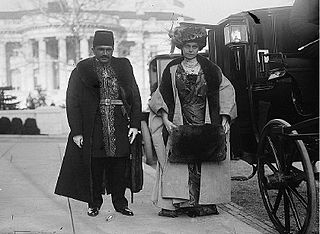History
The United States established diplomatic relations with Equatorial Guinea following the country's independence from Spain on October 12, 1968. [1] Lyndon B. Johnson, appointed Albert W. Sherer, then Ambassador to Togo, as the first Ambassador to Equatorial Guinea on October 28, 1968. [2] Diplomatic relations were formally initiated on November 21, 1968, when Ambassador Sherer presented his credentials to the Equatorial Guinean government and the American Embassy in Santa Isabel (current day Malabo) was officially established on August 1, 1969, with Albert N. Williams serving as Chargé d’Affaires ad interim. [2]
Diplomatic relations were suspended on March 14, 1976, when U.S. Ambassador Herbert Spiro and a U.S. Consul were declared personae non gratae after Equatoguinean Deputy Protocol Director Santiago Nchama presented them with a letter accusing the U.S. government of engaging in subversive activities in the country and complaining about U.S. foreign and domestic policy, including the Vietnam War and U.S. nuclear weapons. A few days later, Equatorial Guinea's foreign ministry sent a telegram to the State Department announcing that the two U.S. diplomats were barred from returning to the country. [3] [2] Relations were normalized again on December 19, 1979, upon the credential presentation of Mabel Murphy Smythe-Haith as American Ambassador. [2]
The U.S. Embassy in Malabo was once again established on June 11, 1981, with Joanne Thompson as the Chargé d’Affaires ad interim, only to be closed on October 31, 1995, with its functions temporarily moved to the U.S. Embassy in Yaoundé, Cameroon. [2] In response to growing economic and political interests, particularly pertaining to energy access and security, the U.S. Government reopened the Embassy in Malabo in 2006. Donald J. Johnson became the first resident ambassador in over a decade when he presented his credentials on November 23, 2006. [2]
This page is based on this
Wikipedia article Text is available under the
CC BY-SA 4.0 license; additional terms may apply.
Images, videos and audio are available under their respective licenses.






